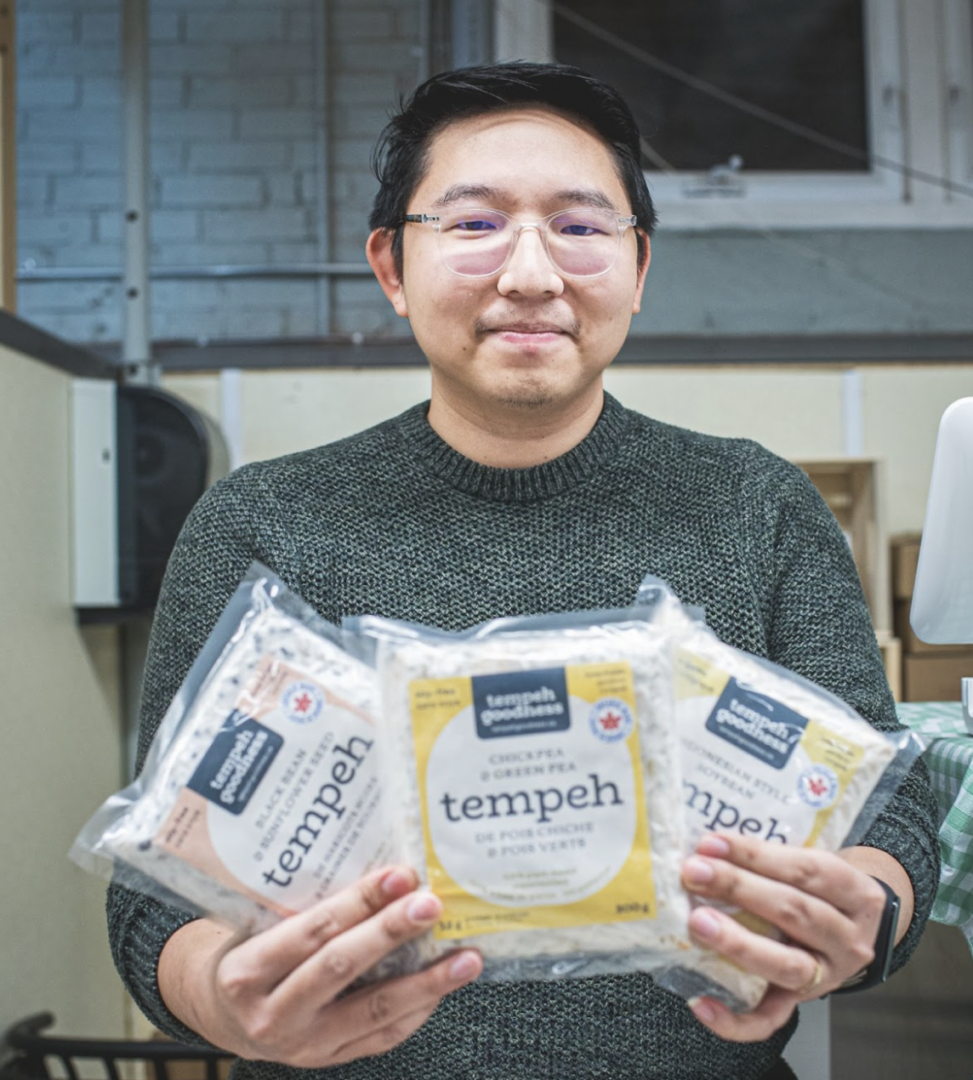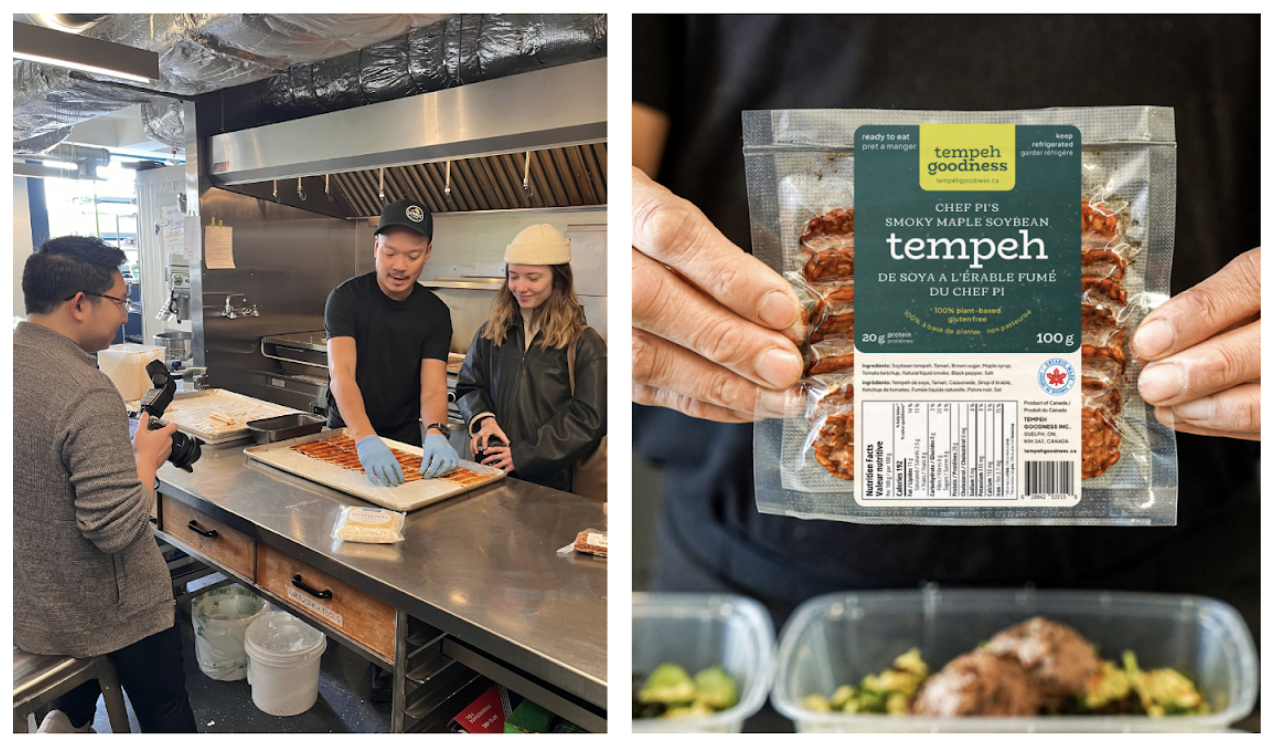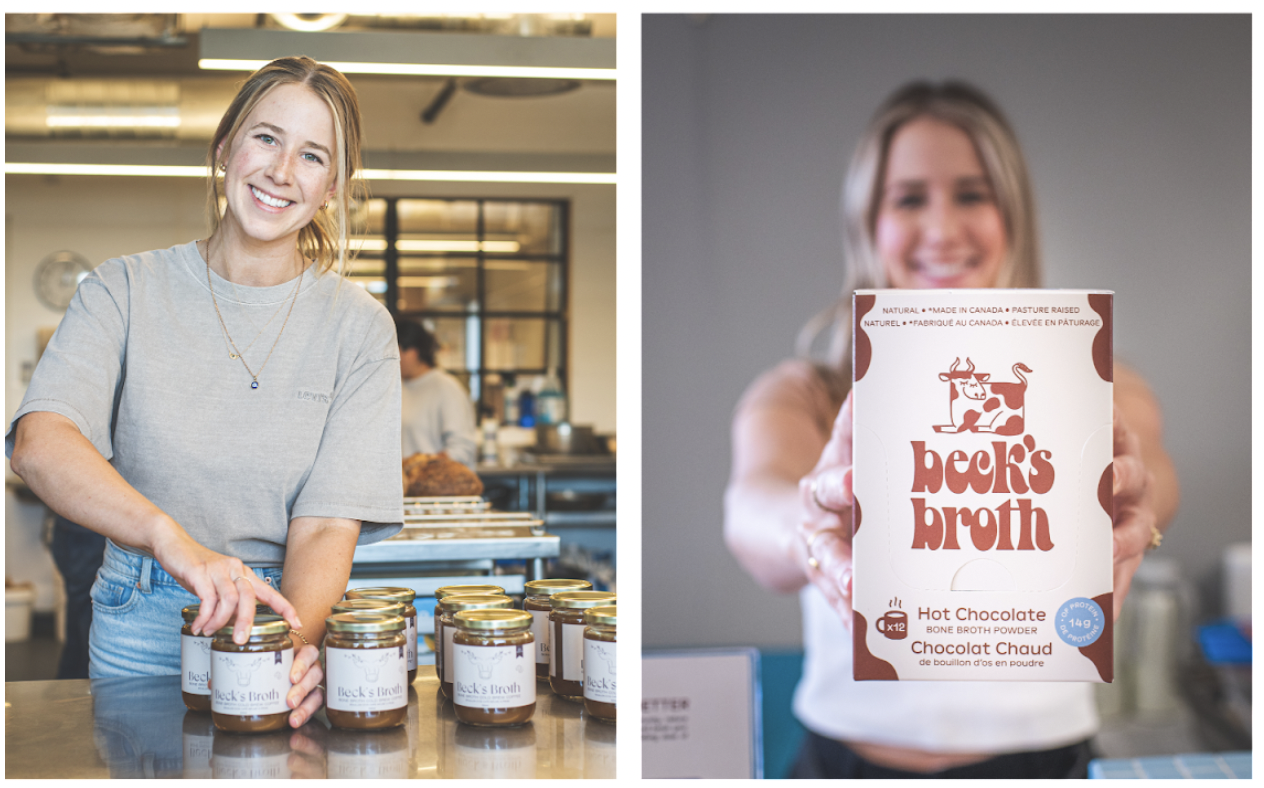Nourish Kitchen and the SDGs: Harnessing the power of food for a sustainable future
10C’s shared community kitchen utilizes food to foster community, collaboration, innovation, and cultural awareness.
Within two hours, every last package of the smoky maple tempeh was gone.
Curious market patrons—many learning about the Indonesian fermented soybean dish for the first time—were so intrigued by the food’s high-protein content and prebiotic benefits that they decided to bring home a vacuum-sealed package and give it whirl.
The unexpected popularity at the Guelph Farmer’s Market was a win for both Clement Kurnia, who founded Tempeh Goodness, along with his wife Stephanie Handy, and Pi Reyes, owner of Pivate Chef. These food entrepreneurs came up with the idea for this new value added product together while working at 10C’s Nourish Kitchen, a shared community kitchen designed specifically to support this kind of collaborative partnership.
“Before meeting Clement and Stephanie, I wasn’t a big fan of tempeh—I didn’t even know it was Indonesian,” says Pi, the brains behind the smoky maple marinade. “But working together in the kitchen, I gave his tempeh a try—and it wasn’t like anything I’d had before. It was way better. So I started integrating it into my recipes.”

Clement, the designer behind the smoky maple packaging, and Stephanie, a food scientist with over a decade of experience, launched Tempeh Goodness, specifically because the mainstream grocery store brands were doing such a poor job of representing their cultural comfort food. “Having offered fresh and plain tempeh, for some time, we recognized the demand for variety and innovation” says Clement. The new line of flavoured tempeh products was developed with Chef Pi and informed by feedback they were getting from customers at Guelph Farmers’ Market and other retail locations.
-Clement Kurina, Co-founder of Tempeh Goodness“When we came to Canada, my wife and I were disappointed that we couldn’t find tempeh of high quality here,” he explains. “Existing companies in the marketplace have no ties to our culture—few people even know about tempeh’s origins.”
Both Clement and Pi joined Nourish towards the end of 2022, when their entrepreneurial ventures were poised to outgrow their respective home kitchens. Since then, they—along with the rest of the Nourish crew—have formed both a friendship and collaborative business relationship.
Before coming up with the idea to slice the locally made tempeh into “bacon-like” strips and marinate them in a smoke-flavoured sauce, Pi had integrated it into a variety of different meal delivery dishes, including his Quinoa Power Bowl. The chef has also created meals that use salsa from fellow Nourish member Rodolfo’s Rebel Foods Salsateria, shares surplus ingredients with another Nourish meal delivery business, Lady Sara’s Bounty, and relies on Nourish and 10C members to taste test his innovative creations before sending them to market.

This idea that food can foster a sense of community, collaboration, innovation, and cultural awareness—and advance the SDGs in the process—is precisely why Nourish came into existence, and what the team at 10C is working diligently to nurture.
The story behind Nourish
The idea for Nourish first came about around 2015, during a 10C Shared Space community meeting. Given that 10C was created to foster a sense of community connection in Guelph—and because Guelph is a well-known food hub—members believed the non-profit should lean into the community-building nature of food, and integrate it into the organization’s mission.
In that spirit, when it came time for 10C to expand into its new location, making room for a community kitchen was a top priority.
-Julia Grady, Executive Director and Co-Founder of 10C Shared Space.“Our old facility only had a sink—you couldn’t even make lunch onsite. We wanted people to be able to connect around food—and we wanted to create more opportunities to bring food onsite.”
A commercial kitchen was appealing because it provided a shared space for people to gather, share meals, and expand their culinary knowledge. At the same time, it offered 10C an opportunity to provide onsite event catering and, of course, it gave food entrepreneurs access to a Public Health-inspected venue—a necessity if you want to sell food for public consumption in Ontario.
“Before Nourish, it was difficult to find an affordable commercial kitchen—particularly if you were producing food on a small scale,” says Julia.
With the support of grant funding, work on the kitchen started in 2017—and it unofficially opened in March 2020.
The role of the SDGs
As an organization committed to both advancing the SDGs in its own work, and raising awareness around them in the community, it was important to 10C that Nourish make intentional traction toward the goals.
“Like many organizations, we found it very easy to establish alignment with the SDGs, but harder to figure out how to measure them,” acknowledges Julia.
During the initial waves of Covid-19 pandemic lock-downs most of the food coming out of the Nourish Kitchen supported emergency food programming locally. With a focus on direct service during this time, 10C measured how many kilograms of food went to feed those in need—a number that aligned with SDG 2: Zero Hunger. An estimated 2,518 frozen meals were prepared for the SEED’s emergency food delivery program with a total of over 4,200 kg of social-purpose food prepared and delivered.
That said, after 2020, the way that 10C thought about the impact of Nourish changed—which is common even outside of a pandemic.
“Every couple of years, it’s helpful for any organization to look at its impact framework and see if it’s still relevant,” Julia explains. “A good question to ask is: Are the ways you’re measuring impact still practical?” Taking a step back – it was clear that the kitchen could play a critical role in supporting the growth and development of food entrepreneurship across Guelph and Wellington.
Today, Nourish is making traction on four key SDGs:

To make sure it doesn’t lose focus on the bigger picture, 10C uses a logic model to outline Nourish’s impact goals, the related SDGs, and the activities that will ultimately support this change. The logic model also contains key indicators to track impact in the short-term, medium-term and long-term.
So, as an example, one sign that Nourish is making traction toward SDG 8 in the short-term is a busy, active kitchen. To measure this, the organization is keeping track of the number of kitchen hours that are booked, both monthly and annually. In the medium-term, 10C expects to see more enterprises collaborate with each other—and it plans to measure progress by gathering stories of how enterprises are partnering and collaborating with each other.
-Emily Hansen, 10C Community Learning and Social Impact Lead“Making Nourish work requires lots of staff hours and support. Having a logic model – with clear alignment to the SDGs – means that our whole team, including those working to keep the kitchen clean, or onboard new members, or support members to launch new initiatives have a clear idea of why the kitchen exists and what we hope to achieve in the long term.”
In addition to tracking its own SDG progress, 10C also seized the opportunity to introduce the SDGs to food entrepreneurs—many of whom were learning about them for the first time. The goal – across 10C’s membership – is to introduce the SDGs and help enterprises understand how they can align and make traction towards the goals.
“Using the SDGs, we want to help food entrepreneurs and orient their work around the SDGs” Julia explains. In this way – Nourish kitchen is working to amplify impact across the network of food enterprises supported by the kitchen.
Impact
Opening weeks before pandemic lock-downs took effect, Nourish had a slow start – taking time to establish itself as an incubator for food enterprises and ideas. However, since then popularity and use of the kitchen has increased significantly.
Today, the kitchen is busy – supporting regular use from 22 active members.
Since 2022, Nourish has supported 55 small enterprises and community food projects, including many local businesses in their startup or early growth phases.
One such example is Beck’s Broth. Beckie Prime, owner and founder of the company, brewed her first batches of delicious bone broth hot chocolate in the Nourish Kitchen in 2021. Since then, Beck’s Broth has outgrown the Nourish Kitchen space, expanding to include a new powdered product line that is currently being shipped across Canada.

In total, members have clocked 10,651 hours in the kitchen since 2022—48% of which were shared between more than one enterprise or group which creates more opportunity for connection and collaboration between local enterprises.
Based on feedback from current Nourish members, a survey in 2023 found that all who responded appreciated the kitchen space and facilities, while 75% said that the kitchen has supported their business growth. Sixty-three percent, meanwhile, say working in the kitchen has improved their product.
-Nourish Kitchen Member“We simply wouldn’t have kitchen space without 10C, and it’s allowed the operation to break even quite quickly vs. establishing a new one.”
This kind of direct feedback helps 10C see—and measure how—the Nourish Kitchen model is achieving impact and making traction towards the SDGs.
Moving forward
Looking ahead, the team at 10C intends to build on Nourish’s success by introducing new opportunities for community-based food programming and innovation.
Part of this involves expanding the programming offered at Nourish, allowing more people to learn about food and develop new skills around it. For instance, the organization recently ran SuperFoodies, a six-week program designed to get kids excited about food—as well as a pasta-making night hosted by Piccolo Farm Organics, that dove into the chemistry, physics and art of making fresh, old-world style pasta.
Additionally, a core component of renovations at the Guelph Farmers’ Market are complete, is the development of a second shared commercial kitchen—inspired by the success of Nourish. This new kitchen will expand support for food entrepreneurship beyond 10C’s doors—offering even more opportunities for residents to connect around food.

